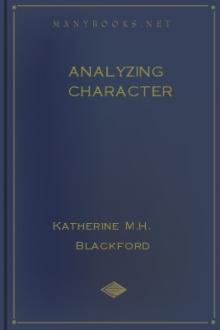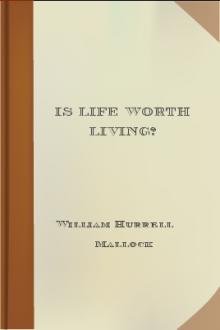Analyzing Character, Arthur Newcomb [popular romance novels .txt] 📗

- Author: Arthur Newcomb
- Performer: -
Book online «Analyzing Character, Arthur Newcomb [popular romance novels .txt] 📗». Author Arthur Newcomb
PATIENT TOIL HIS GENIUS
Coming back from the university after having finished his course, T. found a position as engineer in an electric light and power plant. Then he began saving up money to purchase the necessary equipment for a laboratory of his own. Finally, he had a little building and was one of the proudest young men we ever saw. Little by little, he added to his apparatus the things he needed. Several nights a week, after his hard day's work in the engine room, he toiled, trying to solve the problem upon which he had fixed his mind. About this time he married, and he and his wife moved into a narrow little flat. Years passed, children came into the little flat, and still he worked at his problem. Again and again, and still again, he failed. Yet, each time he failed, he told us he was coming closer to the solution. At last came the day, after many heart-breaking experiences, when the problem, while not fully solved, had at least revealed a solution which was commercially valuable.
His years of self-denial and toil seemed to be about to end in success. But he found that he had only begun another long period of discouraging and almost desperate work. It was a struggle to scrape together the necessary funds for securing a patent. If he was to complete and perfect his invention, he must have more capital. So, with his model, he made the rounds of manufacturers of engines, manufacturers who used engines, railroads, steamboat companies, electric light and power companies; in fact, everywhere he thought he might get some encouragement and financial assistance. His little family was living on short rations. He himself had not eaten as he ought for years. One after another, the men in authority said: "Yes, your proposition looks good, but I don't think it can ever be made practical. Some of the brightest men in the engineering profession have spent years trying to solve that problem, and have not found the answer to it. I do not believe that it will ever be found. You seem to have come near it, but yet you have not found it, and we cannot see our way clear to put any money into it."
REAPING HIS REWARD
T. argued, pleaded, and demanded an opportunity for a demonstration, but all in vain. Then, one day, a lawyer, who had been consulted by T., said: "I have no money to invest in anything myself, but I'll tell you frankly and honestly, it looks good to me. Now, I happen to be on very good terms with Mr. J. over at the T. & B. Company. He has been interested in this problem for years and has worked along toward its solution. He understands every phase of it, and I believe he will do something with your device. Unless I am mistaken, he will be interested in it, and will give you an opportunity to demonstrate it. If your demonstration works out as well as you think it will, he has the authority to put you in a position where you can go ahead and perfect it if it is perfectible. I will give you a letter of introduction to him." And thus began T.'s prosperity. He now lives in a beautiful home on a wide boulevard. His invention, still short of perfection, but highly valuable, is coming slowly into use, and would probably be in very widespread use were it not for the fact that he is constantly working on it, perfecting it, improving it, and hoping finally to have a complete solution to the problem.
CHAPTER VIII THE IMPRACTICAL MAN"My life is a failure," wrote Sydney Williams to us, "and I do not know why."
In middle life my grandfather Williams moved his family across the Potomac River from Virginia in order to study to enter the ministry. He is said to have freed some slaves at that time, so he must have been a 'planter,' He became a Congregational minister. My grandfather Jacobs was a carpenter; but, as I knew him, and for some years before my birth, he was a helpless invalid from paralysis on one side.
My father graduated from college and then became a minister. He preached for many years, then he took up work with a religious publishing house, finally having charge of the work at St. Paul. He was there, I believe, when he was elected president of a small school for girls. He assumed his new duties in June and I was born the following November. (I am the youngest of eleven children, of whom there are now three boys and five girls still living, three boys having died while still babies before my birth.)
Until I was nearly twelve years old we lived at the girls' school, which father succeeded in greatly enlarging. Mother taught me to read a little and write a little. She and others read to me a great deal. I had no playmates except my nephews and nieces, to whom I was continually being pointed out as a 'model.' Out of the sight of the grown-ups, I was not always such a model as they could have wished; yet I did feel a certain amount of responsibility that was oppressive and repressive. When nearly eleven, I was sent to the public school, where I was soon promoted with two others. The next year father and mother moved into a larger town, so that I had a few months of real home life before my father's death in April, 1893.
Then my mother, her mother, and I went to Wisconsin to live with a married sister of mine whose husband was the Presbyterian minister there. I entered the fourth grade of the public school that fall; but, by the end of the school year, I had completed the fifth grade.
My mother died in May, 1896. I continued to live with my sister. Finished the seventh grade that June, but entered preparatory school that fall. In November, 1897, my brother-in-law moved to Iowa, and I made the mistake of deciding to go with him. While living in Wisconsin, I had become acquainted with a fine lot of boys. One of them organized a small military company; I was elected quarter-master and, later, lieutenant. I now know that that was because we were considered 'rich,' Also in Wisconsin I overcame some of my extreme bashfulness in regard to girls, derived from babyhood experiences. In fact, one reason I decided to leave Wisconsin was the fear that the friendship with one girl might become too serious; I was beginning to shun responsibility.
ATTAINMENTS IN SCHOLARSHIP
In Iowa I entered the high school and completed the tenth grade the next June (1898). My elder brother was my official guardian and he wanted me to make a change. As a result, in September, 1898, I had my first experience of being away alone by entering a famous academy. There I earned the reputation of being a 'grind,' and graduated second in my class in June, 1901. While there I went out for football, and made the third team and even played once on the second. My poor eyesight hindered me somewhat, but still more the fact that I was not eager to fall down on the ball on the hard ground when it did not seem to me necessary. I was quite ready to get hurt, if there was any reason for it. That, too, was a mistake on my part.
That September I entered Harvard University. My father had left some insurance, and mother left some of it to me for a college education. She expected, as did my sisters and brothers, that I would become a minister. By the end of my Freshman year I had decided that I could not do so, but from that time I was unable to decide what I did want to do or could do. Consequently I did not get the good out of a college education that I might have. Moreover, though I stood fairly well in most of my classes, I did not always understand the subjects as well as the professors thought I did. As soon as it became possible to elect subjects, I dropped Latin, Greek, and German, and specialized in history, economics, etc. I graduated 'Cum Laude,' But that was really a failure, considering what I might have done.
But I did well enough to receive recommendation for a $500 fellowship that enabled me to return for another year. I did work which caused me to be recommended for an A.M. degree. But I felt that I had so little in comparison with others, that I was actually ashamed to receive it. Socially, however, that extra year was a very delightful one for me.
During two summers as an undergraduate, I worked at Nantasket Beach selling tickets in the bathing pavilion for $50 a month, besides room and board. I made good, much to the surprise of the superintendent.
HUNTING A JOB
So then I was finally through college in June, 1906. It is almost incredible how very childlike I still was, so far as my attitude toward the world was concerned. I had high ideals, and I wanted to get into business, but where or how I did not know. Moreover, my money was gone. A student gave me a note with which I intended to get his previous summer's job as a starter on an electric car line owned by a railway company. The position was abolished, however, so I became a conductor on a suburban line. Unfortunately, my motorman was a high-strung, nervous Irishman, who made me so nervous that I often could not give the signals properly, and who made life generally unpleasant for me. He professed a liking for me and did prevent one or two serious accidents. At the same time, he said I was the first 'square' conductor he had ever worked with, and, no doubt, he missed his 'extra,' After three weeks of him, and of the general public's idea that I must, of course, be knocking down fares, I resigned. However, the superintendent offered me a job as 'inspector' of registers on the main line, a job that he was just creating. When the rush was over after Labor Day, I was again out of a job. I might have secured a clerkship with the railway company, but I was foolish enough not to try.
A few weeks later found me established in the district office of a correspondence school not very far from New York City as a representative. At first I gave good promise of success, but I lost my enthusiasm and belief in the school and became ashamed to be numbered as one of its workers because of the character of most of the local field force at that time and before my time. The reputation of the school in that place was not very good. Also I was not successful in collecting the monthly payments from those who had hard luck stories or had been lied to by the man who had enrolled them. By the end of two months I was ready to quit, but my immediate superior begged me to stay, in order to keep him from having to break in a new man just then. At the end of about four months I did resign to save being kicked out. Mind you, I was to blame, all right; for I had given up a real continuous effort beyond the merest routine and the attempt to collect





Comments (0)